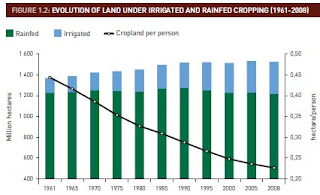Without water, neither small businesses nor major global industries can function.Not family farms or major agrinusinesses.Not energy production facilities or computer manufacturer or steel companies.Similarly, poor water quality, or limited or unreliable access to water means higher costs for all businesses - and all consumers.
Water scarcity means greater risks for community's long-term viability and a negative impact on their competitiveness.It also means that a comunity's ability to grow and create jobs is at risk.Regardless of whether water has become the new oil, one thing is certain: water is ironically both taken for granted and serves as the engine of our economy.If not proparly managed, water scarcity will directly affect the local ability to grow and create jobs.
Here are five consequences, of water scarcity:
Water scarcity means greater risks for community's long-term viability and a negative impact on their competitiveness.It also means that a comunity's ability to grow and create jobs is at risk.Regardless of whether water has become the new oil, one thing is certain: water is ironically both taken for granted and serves as the engine of our economy.If not proparly managed, water scarcity will directly affect the local ability to grow and create jobs.
Here are five consequences, of water scarcity:
- Increased global conflict
Fresh water resources are often shared by two or more countries which may lead to more international conflicts as fresh water becomes more scare.The united nations has identified 276 transboundery river bassins and 200 transboundery aquifers. While treaties have outpaced acute disputes over the past 50 years (150 verses 37), the US director of national intelligence warned in 2012 report that overuse of water could potentially threaten US national security.
- Lack of access to clean water
Currently, 1.1 billion people in the world lack access to clean fresh water. Without access to clean fresh water, these vulnerable populations are exposed to deadly water-borne illnesses and water gathering can limit educational and ecomic opportunities.As the global population grows and water resources shrink, greater numbers will face the challenges of inadequate water accessibility.
- Food shortages
With a global population on pace to reach 9.6 billion by 2050, shrinking water resources will make it difficult for food production to keep up with rising demand.The united nations warns that political turmoil, social unrest, civil wars and terrorism could result from food shortages unless food production is increased by 60% by 2050.Agriculture already accounts for about 70% of global fresh water withdrawals to keep up with current food demand.Increased far water conservation through water saving irrigation techniques are needed to slow the unsustainable withdrawals from ground water sources.
- Energy shortages
World energy requirements are rapidly increasing with modernization and population growth, however energy production is one of the world's greatest consumers of fresh water resources.In the united states, thermoelectric power plants accounted for 38% of fresh water withdrawals in 2010.Global electricity demand is projected to grow 70% by the year 2035 with India and China accounting for half of the growth.Alternative energy sources like wind and solar energy require far less water to produce but only make up a small fraction of today's energy production.
- Economic slowdown
The United Nations estimates that half of the world's population will live in areas of high water stress by the year 2030.It is difficult to have a thriving economy when fresh water is not easily accessible for industrial, farming and individual use.Production of water-intensive goods like cars, food, and clothing could be limited by lack of fresh water resources.Lack of fresh water can also affect worker productivity by causing illnesses and higher water costs for individuals can reduce household disposable income.
-Frédéric Betta-Akwa

Commentaires
Enregistrer un commentaire